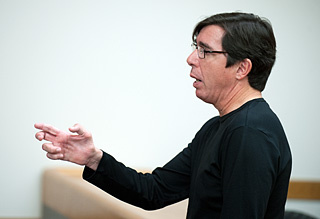When Enrique Carrasco reads a legal case about contract law, he doesn’t see a dry recitation of facts and obligations. He sees drama.
So much drama, in fact, that the University of Iowa law professor uses them as the basis for short plays he writes in his spare time that help students understand the social forces that shape contract law.
“Students come in thinking contracts are going to be dry and technical—the piece of paper you sign when you rent your apartment, for instance,” says Carrasco, who teaches contracts to first year students. “In fact, every case is a narrative about social constructs, and they tell us wonderful stories about human beings. They teach us about race, gender, class, and power as they relate to law in general and contract law in particular.”
Three of his one-act plays will be presented Friday, Nov. 16, at 1 and 3 p.m. in Room 235 of the Boyd Law Building. The Benevolent Man, Miss Understanding, and The (Dysfunctional) Study Group are based on real life court decisions and illustrate the legal principles on which the decisions are based while at the same time contesting those principles.

They don’t attempt to dramatize the cases themselves, but present the precedents in settings law students can relate to. So while The (Dysfunctional) Study Group explains the principle of good faith in contract formation that comes from the 1956 decision in Fiege v. Boehm, the drama comes from four angst-ridden first-year law students who get together to examine the case and prepare for class the next day.
“The play allows me to explore gender relationships and power in the 1950s in a different way than typical case recitation in class,” says Carrasco, who is a member of the Dramatist Guild for a play he wrote that was professionally produced by a New York theater company in 2002.
The legal issues in Miss Understanding, meanwhile, are about settling contracts that lack clarity or are based on a factual inaccuracy, and come from the English common law case Raffles v. Wichelhaus. But the lessons are presented by an attorney who has an existential crisis while arguing an appeals court case.
And The Benevolent Man deconstructs a hypothetical well known to all law school graduates about a rich man offering a gift of a coat to a tramp, but telling him to walk to the shop to get it.
All of the actors are law students, none of whom have any significant acting experience.
“Acting experience doesn’t worry me too much,” Carrasco says. “They’re excited about doing well, and they’re doing it seriously, and that’s most important for me.”
He’s also getting help from his son, Felipe, a UI undergraduate theater major in the College of Liberal Arts and Sciences.
“I’m confident as a playwright, and Felipe has provided me with invaluable directing advice with everything from how to get the actors to interact with each other effectively to their movement on stage,” he says.
Carrasco has been writing short plays in his spare time since he was assigned to write a paper about Chilean dictator Augusto Pinochet in a college political science class.
“I don’t know what possessed me, but I wrote a play instead, and the professor loved it,” he says.
His professional production, Soccer Moms, came as part of a short play festival produced by Theatre Three in Port Jefferson, NY. That play is about two mothers chatting while watching their children play soccer, the conversation eventually revealing the limits of their angst-ridden suburban lives. He says the piece was inspired by conversations overheard while attending his own children's soccer games, and by the then-emerging concept of the soccer mom as a political demographic.
He says he’s not following in the footsteps of lawyers like John Grisham or Scott Turow, who mostly gave up the profession to write full-time. But he does plan to keep writing short plays whenever a case so moves him, or his students need a little help in understanding a concept.